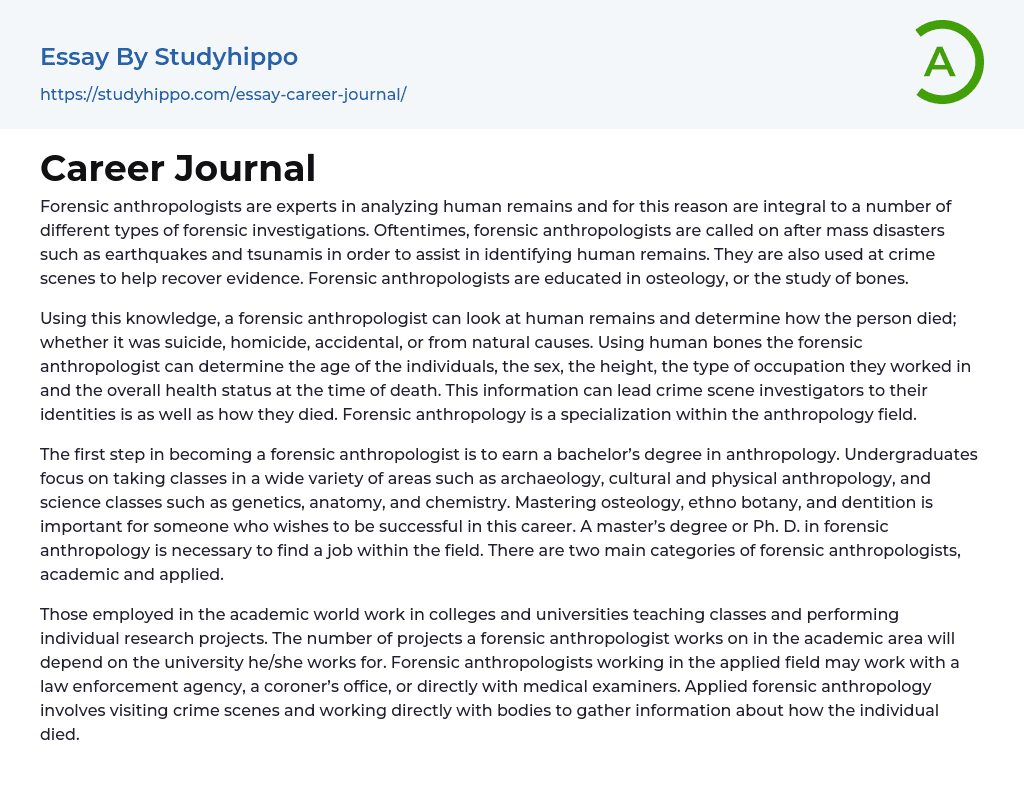Forensic anthropologists are vital in a range of forensic investigations, analyzing and studying human remains. Their role is especially important when it comes to identifying human remains after major disasters such as earthquakes and tsunamis. They also assist in gathering evidence at crime scenes, specializing in osteology, the study of bones.
By utilizing this information, a forensic anthropologist can analyze human remains to determine the cause of death – whether it is suicide, homicide, accidental death, or natural causes. Through the examination of human bones, valuable insights regarding the person's age, sex, height, occupation, and overall health at the time of their demise can be derived by the forensic anthropologist. This data assists crime scene investigators in identifying individuals and comprehending the circumstances encompassing their fatalities. Forensic anthropology represents a specialized branch within anthropology.
...To become a forensic anthropologist, the first step is to earn a bachelor's degree in anthropology. During their undergraduate studies, students will focus on various subjects including archaeology, cultural and physical anthropology, as well as science courses such as genetics, anatomy, and chemistry. A strong understanding of osteology, ethno botany, and dentition is essential for success in this profession. To obtain employment in the field, individuals must pursue either a master's or Ph.D. degree in forensic anthropology. Within the field of forensic anthropology, there are two main categories: academic and applied.
Forensic anthropologists in academia work at colleges and universities, teaching classes and conducting research. The workload varies depending on the affiliated university. In the applied field, they collaborate with law enforcement agencies, coroner's offices, or medical examiners, visiting crime scenes and examining bodies to gai
insights into the cause of death.
- Population essays
- Cultural Assimilation essays
- Demography essays
- Ethnographic essays
- Population Growth essays
- Interview essays
- Job Interview essays
- Career Choice essays
- Career Goals essays
- Portfolio essays
- Community Service essays
- Work-Life Balance essays
- Performance Appraisal essays
- Job essays
- Employee essays
- Skills essays
- Service essays
- Vocation essays
- Internship essays
- Work Experience essays
- Duty essays
- Dream Job essays
- Career Plan essays
- Anthropology essays
- Audience essays
- Charity essays
- Cultural Competence essays
- Emile Durkheim essays
- Gender Roles essays
- Generation essays
- Globalization essays
- Interpersonal Relationship essays
- People essays
- Race essays
- Social Change essays
- Social Class essays
- Social Movement essays
- Social Science essays
- Social Status essays
- Social Stratification essays
- Society essays
- Sociological Imagination essays
- Sociological Perspective essays
- Sociological Theories essays
- Stereotypes essays
- Web Dubois essays
- Career essays
- Career Path essays
- Homeless essays
- Labour Economics essays




